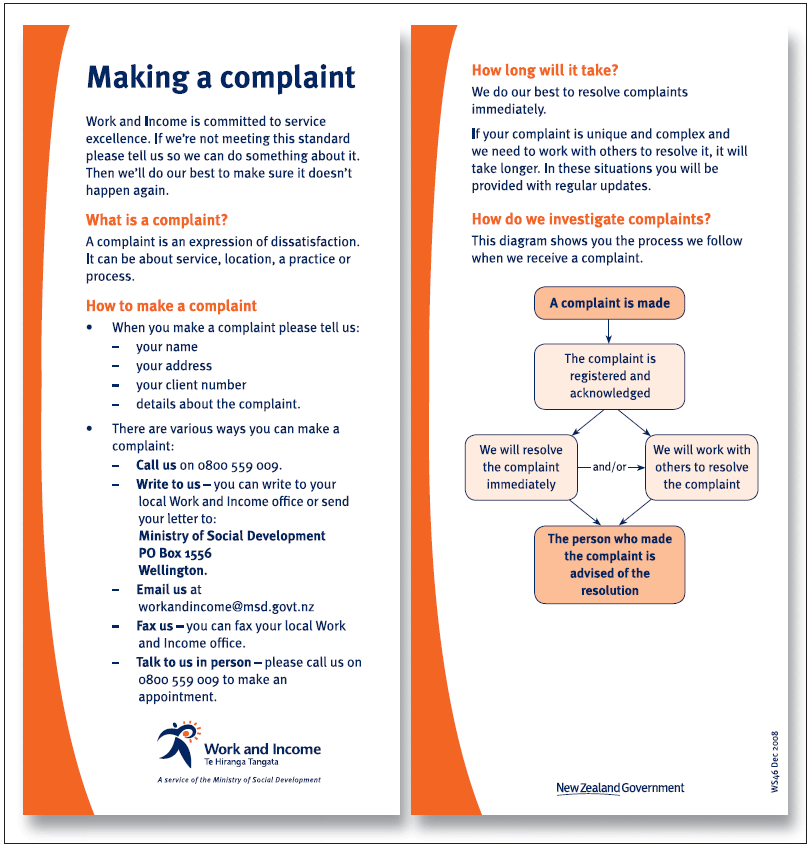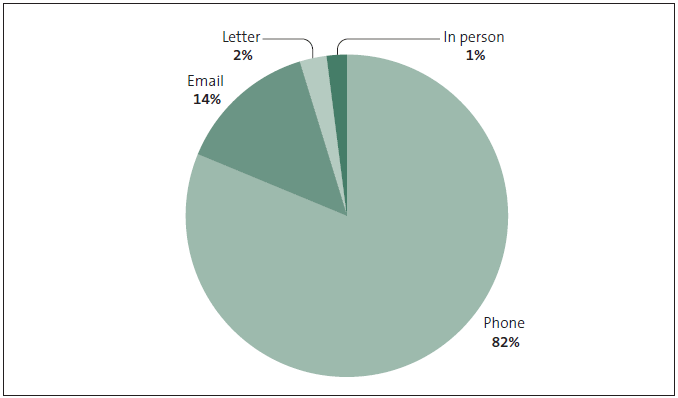Part 2: Making complaints
2.1
In this Part, we look at the Ministry's policies for managing complaints and discuss whether it is easy for a client to complain to each of Work and Income, StudyLink, and Senior Services.
Summary of our findings
2.2
The Ministry has no Ministry-wide formal policy and process for managing complaints. Each section runs its own process, with some good practices.
2.3
Clients can make a complaint in various ways. It is reasonably easy for clients to complain. However, some of the information on the Ministry's websites is difficult to find and there is potential for confusion about how to lodge complaints.
No Ministry-wide policy or process for managing complaints
2.4
The Ministry manages complaints in several ways. There is no formal Ministry-wide policy and process for managing complaints. Each section runs its own process. For example, Work and Income has a process for managing complaints on the Ministry's intranet, Doogle. In our view, that process is well set out. Work and Income's contact centre staff are told about the process for managing complaints as part of their induction programme and can access Doogle.
2.5
The other sections do not use Doogle to manage complaints. We saw no documents that show that StudyLink and Senior Services have a formal process for managing complaints.
2.6
StudyLink has a "common understanding" that the Report Writing Team manages complaints. The Senior Services Review Team manages most matters and complaints that Senior Services National Office receives. There is no formal process for managing complaints locally.
Defining a complaint
2.7
Because there is no formal Ministry-wide policy on complaints, the Ministry has no universally applied definition of a complaint.
2.8
The Ministry's website provides a definition for the public (see paragraph 2.13) that is not the same as the definition available to Work and Income's staff.
2.9
Work and Income was the only section that formally defined complaints for staff. Doogle defines a complaint as "an expression of dissatisfaction usually about service, staff, behaviour or the environment". It provides examples of each type of complaint to help staff work out how to record a complaint.
2.10
The complaints process outlined on Doogle explains that a review of a decision about whether someone is entitled to a particular form of support from Work and Income is not a complaint, because reviews of decisions have their own guidelines and processes. However, some senior staff pointed out that "service complaints often go hand in hand with reviews of decisions".
2.11
Although Work and Income formally defines a complaint, there appears to some inconsistency in how this definition is applied – for example, in working out whether a matter raised by a client is a complaint or a question. Other sections of the Ministry also grapple with this matter (see Part 3).
Managing unreasonable complainants
2.12
The Ministry has a formal policy for working with "unreasonable, difficult or vexatious complainants" and has produced guidelines for its staff. The guidelines draw on the New Zealand Office of the Ombudsman's practice manual for dealing with unreasonable complainants. The guidelines are a resource for dealing with clients and Reviews of Decisions. They are "owned" by the Ministry's Client Advocacy and Review team, who deal with all Reviews of Decisions. The guidelines are also intended to be helpful to other sections of the Ministry. It was not clear to us how widely the guidelines were used for complaints about how services were delivered. The Ministry acknowledged that this was a matter that it could look into.
Ease of making a complaint
2.13
Information about making a complaint is clearly visible and accessible on the Ministry's website under "Contact us". It defines a complaint as:
… an expression of dissatisfaction when the Ministry has not met your expectation. Your complaint may be about:
- An incident or service issue
- An income support or pension decision
- Practice
- Process
- Policy.
2.14
The website information tells people that, if they have a complaint, it is best to first contact the manager of the particular office concerned. Otherwise, they can contact the Ministry by telephone, mail, email, or fax. We note that the telephone number given on the Ministry's main website is not a free-phone number, although all three sections provide 0800 telephone numbers. These are also free for callers on cellphones. People who had complained about Work and Income who had used the telephone line felt that complaining by telephone was easy. For example, one interviewee commented that the staff member they spoke to on the phone was clear and made them feel comfortable about making the complaint.
2.15
Although information on Doogle explains that a complaint is not a review of decision, the material for clients clearly states that a complaint can be about a decision about income support or a pension. The process for reviewing complaints about an income support or pension decision is different from that for an incident or service matter.
2.16
The link to the review of decision process, which appears under the "What is a complaint?" section on the Ministry's website, is titled "Making a complaint about an income support or pension decision (Review of Decision process)". We question whether it is clear enough that this link is for lodging a review of decision and not for making a complaint about how the person was treated. The Ministry receives some complaints about service delivery through this website link, which suggests that some people do not make this distinction.
2.17
Information about how to make a complaint is available on the individual sections' websites. However, finding this information is not straightforward. This was the experience of one interviewee who had used the Work and Income website to make a complaint. On the Work and Income website, the complaints link is under "General enquiries for under 65". On the Seniors website, the complaints link is under "What we can do for: Seniors – Getting in touch with us – Work and Income general enquiries".
One interviewee commented that the staff member they spoke to on the phone was clear and made them feel comfortable about making the complaint.
2.18
Typing "making a complaint" in the search box on the Work and Income and StudyLink websites brings up the link to the complaints information. Senior clients are directed to the main Ministry website.
2.19
For people who do not or cannot use the website, the Ministry has pamphlets about the complaints process. The Ministry confirmed these pamphlets are distributed to all Work and Income service centres. Figure 1 shows the Work and Income complaints pamphlet.
Figure 1
Work and Income complaints pamphlet

Source: Ministry of Social Development.
2.20
We note that the definition of a complaint in this pamphlet is not the same as the definition of a complaint provided on the Ministry's main website.
2.21
Work and Income case managers can also tell people about how to make a complaint if the person is not satisfied with a decision or the service they have received. People can talk to a manager at the time or follow the process for reviewing decisions.
2.22
For people who might need extra help, the Ministry aims to meet the Web Accessibility Initiative Level 3 accessibility standards. These standards are designed to help people with disabilities to access the Internet. The Ministry told us that its websites meet these accessibility standards.
2.23
All three sections provide a free fax facility for people who are deaf or find it hard to communicate by telephone. The Ministry also provides access to a "relay line" for people who have hearing or speech impairments. This involves the use of a telephone typewriter. The person dials a toll-free number to New Zealand Relay (a government service), which relays the response between the Ministry and the caller.
2.24
Also, Work and Income has multilingual lines and people can speak to someone in one of 11 languages other than English. These free 0800 telephone lines are open between 8.30am and 5pm Monday to Friday. Information about this service is on the Work and Income website and in Work and Income's Our Services and Standards brochure. Senior clients are directed to this information through the Getting in touch with us link on the Ministry's website. The StudyLink website did not provide any information on multilingual services.
2.25
The telephone survey showed that only 36% of the complainants surveyed tried to find information about making complaints. More than half (57%) of the 36% who tried to find information found the information they were seeking and 43% (of the 36%) did not. Those most likely to find information were people looking to find out how to make a complaint and what would happen next. Three-quarters of complainants (74%) who were looking for this information found it.
2.26
Of those who found information, 63% thought the information was easy to find, 68% considered that the information was helpful, and 82% agreed that the information was easy to understand.
2.27
In our view, making a complaint is reasonably easy and the mechanisms for complaining are accessible. However, there is room to improve how easy it is to find information about complaining on each of the individual sections' websites.
Channels for making complaints
2.28
Complaints to the Ministry can be made verbally or in writing (letter or email). They can be lodged through the contact centres, service centres, regional offices, or the National Office. They can also be sent to the Minister's office or the Chief Executive's office. Complaints can be made by the person using the Ministry's services or by a person or organisation acting on their behalf, such as an advocate (for example, beneficiary groups or a family member) or a member of Parliament. Some staff told us that they maintain relationships with the offices of local members of Parliament and with advocacy groups for this purpose.
2.29
Figure 2 shows the main channels that people used to make a formal complaint to Work and Income in 2013.
Figure 2
Channels for making complaints about Work and Income, 2013

Source: Ministry of Social Development.
Note: Because of rounding, the numbers do not add up to 100%. Because few people complain by fax and to the Minister's office, we have excluded complaints through these channels from Figure 2.
2.30
Some people express their dissatisfaction with the Ministry though social media or the news media. The Ministry told us that it would prefer to discuss and resolve the complaint directly with the person. The Ministry monitors the news media. Staff pick up these stories, and have a way to refer them to a regional office or the National office as relevant.

